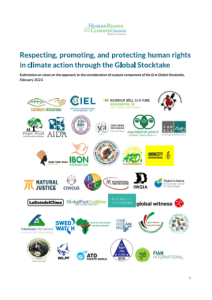Le bilan mondial de l’Accord de Paris (en anglais global stocktake) est un processus visant à faire le point sur la mise en œuvre de l’Accord de Paris dans le but d’évaluer les progrès collectifs du monde vers la réalisation de l’objet de l’accord et de ses objectifs à long terme (article 14).
Les impacts climatiques se produisent à une échelle sans précédent et les rapports scientifiques confirment que nous sommes loin d’être sur la bonne voie pour maintenir le réchauffement de la planète en dessous de 1,5°C. Le bilan mondial de l’Accord de Paris est une occasion cruciale pour changer la direction dangereuse vers laquelle nous nous dirigeons, car il peut effectivement informer le changement nécessaire pour atteindre les objectifs à long terme de l’Accord de Paris.
La Global Pact Coalition soutient cette réponse à l’appel sur l’approche de l’examen des résultats du premier bilan mondial. Cette réponse recommande que les considérations de la composante des résultats du bilan mondial se concentrent sur des discussions qui aboutiront à trois engagements : une élimination complète et équitable des combustibles fossiles, la mise en œuvre d’une approche intersectionnelle et basée sur les droits de l’homme, et enfin, une participation publique accrue et la protection des défenseurs de l’environnement.
Lien vers la note (en anglais) : Human-rights-in-the-GST-joint-submission-February-2023
La note a été soumise en février 2023 à la CCNUCC en réponse à l’appel « Views on the approach to the consideration of outputs component of the first global stocktake » par les organisations membres du groupe de travail sur les droits de l’homme et le changement climatique suivantes :
EarthRights International, Center for International Environmental Law (CIEL), Heinrich Böll Stiftung Washington DC, CambiaMO, Raise Your Voice Saint Lucia, National Indigenous Disabled Women Association Nepal (NIDWAN), Indigenous Environmental Network (IEN), Project Dryad, Asociación Interamericana para la Defensa del Ambiente – AIDA, Soka Gakkai International, Civicus, Natural Justice, International Tibet Network, QUNO, International Work Group for Indigenous Affairs (IWGIA), Global Initiative for Economic, Social and Cultural Rights (GI-ESCR), Climate Refugees, Global Pact Coalition, La Ruta Del Clima, Shariatpur Development Society (SDS), Swedwatch, Franciscans International, Global Witness, FIAN International, IBON International, Brahma Kumaris, Women’s International League for Peace and Freedom, Green Advocates International, Mano River Union Civil Society Natural Resources Rights and Governance Platform, Alliance for Rural Democracy, The Natural Resources Women Platform, Dibeen Association for Environmental Development, One Ocean Hub, Centre for Citizens Conserving Environment & Management (CECIC) Uganda, International Mouvement ATD Fourth World, Amnesty International, Equidad de Género: Ciudadanía, Trabajo y Familia (Gender Equity: Citizenship, Work and Family).


